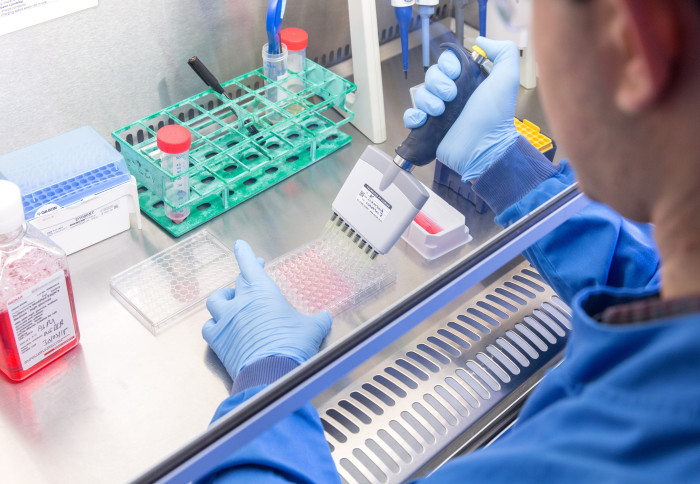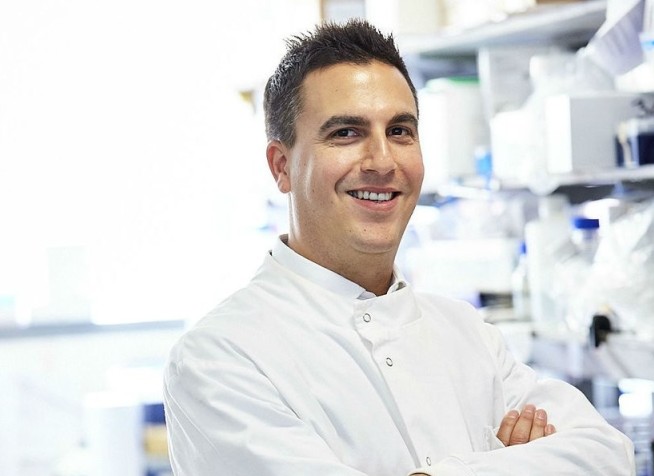Dangoor Fellowship at Imperial will pave the way to more personalised treatment
by Daniel Mapp

A gift from the Dangoor family will fund a Clinical Research Fellowship at Imperial to better understand cancer patients’ response to different drugs.
The £300,000 gift from the Dangoor family’s Exilarch’s Foundation will create the Dangoor Fellowship, and follows a £5 million gift by the Foundation in 2018, which helped to create a pioneering hub for collaborative multi-disciplinary cancer research at Imperial College London.
The Foundation is a major sponsor of cancer research throughout the UK, for example through its support of Cancer Research UK and the Francis Crick Institute, of which Imperial is a founding partner.
David Dangoor, Trustee of the Exilarch's Foundation and an Imperial alumnus, commented: “It’s vital that we back research into cancer at every stage of investigation – from fundamental molecular studies through to clinical trials in patients, such as the one the Dangoor Fellowship will support.
“We’re in a fortunate position in that oncologists have an increasing number of available therapies at their disposal; however, identifying those cancer patients who may or may not respond to treatment is difficult. The aim of this Fellowship is to assess the validity of new approaches to treatment selection, and therefore builds on the Exilarch's Foundation’s strong record of contribution in the field.”
The recipient of the Dangoor Fellowship is Dr James Clark, who will be based in the research group of Dr Jon Krell, Senior Clinical Lecturer in Medical Oncology at Imperial’s Department of Surgery and Cancer. Together they will assess a new method that could eventually help predict which drugs will be most beneficial for individual patients.
Matching the right drug to the right patient
In current clinical practice, oncologists select an appropriate drug for patients based on the type and stage of cancer they have, guided by treatment algorithms and pathways. These pathways are underpinned by clinical trial data, say testing drug A versus B, or combinations of drugs, in large groups of patients, which broadly define efficacy and safety.
In recent years, more personalised approaches that allow treatment to be tailored to an individual patient have been developed, including genomics and molecular profiling. But these are expensive, not always accurate and not always available at all clinics.

Another method, using an Ex Vivo Organ Culture (EVOC) has recently shown early promise in preliminary studies. Dr Krell explains:
“It’s a method whereby we take a biopsy from the tumour of a patient with cancer, and then grow that tumour outside of the patient in a way that allows us to treat it with different drugs and assess response, to determine which drugs are most effective.
“What’s quite novel about the EVOC model in particular is that it maintains the microenvironment of the tumour and so more accurately mimics what is happening in the body, when compared to other related methods that extract the cancer cells from the biopsy to test drug response but get rid of surrounding cells that also make up the tumour, including blood vessels, immune cells and stroma. This model keeps all of that.”
Testing a tumour model
Dr Krell will now lead a trial to comprehensively test the EVOC model, which has been developed by the Weizmann Institute in Israel and medical device manufacturer Curesponse. As part of the trial, biopsies will be taken from patients who will be treated with standard of care anticancer therapies. Patients’ responses to therapy will be assessed using RECIST (Response Evaluation Criteria in Solid Tumours), which includes imaging and tumour marker response. At the same time researchers will develop an EVOC model using the biopsied tissue and treat it with the same therapy as was given to the patient.
This way, responses can then be compared between the patient and EVOC model to establish the predictive power of the test.
For example if the patient responds well to the chosen drug, and the EVOC models shows a similar response, that demonstrates the positive predictive power of the EVOC method. Equally, if the patient doesn’t respond to a drug (despite the guidelines recommending it) and the EVOC model also doesn’t respond, this negative predictive power is also incredibly valuable, as Dr Krell explains:
“From a health economic perspective as well as a patient perspective, that’s really important, because a lot of money is wasted in giving drugs that don’t work, and a lot of toxicity is given to patients through drugs that don’t work.”
Creating synergies in research
A complex trial of this nature requires considerable resources and support to set-up, which is why the Dangoor Fellowship has proved so instrumental.
In addition, both Imperial and the Exilarch Foundation have pre-existing links with the Weizmann Institute in Israel, where the EVOC technology was first developed. This helped facilitate collaborations and the sharing of knowledge.
The recipient of the Dangoor Fellowship, Dr James Clark, is a junior doctor at Imperial and maintains a keen interest in oncology alongside his clinical commitments. Working on the EVOC study will provide an excellent opportunity to learn and develop his skills in the design, implementation and regulation of cancer clinical trials.
The trial also potentially opens up more avenues of research for Dr Clark to investigate as part of his PhD project. For example, the EVOC model could prove useful in understanding which patients will benefit most from immunotherapy. The mechanism of action of immunotherapeutic agents is complex, involving a dynamic interaction in the tumour microenvironment between host immune cells, cancer cells and the molecules they produce. The EVOC helps reproduce this interaction, though may require further development.
Dr Clark comments: “I’m incredibly grateful for the support of the Foundation and the Dangoor family and excited at the opportunity to work on such an important trial, which I believe could make a real and tangible difference to patients. It’s hugely beneficial to be part of testing and developing something which I could well be using in the clinic in the future.”
Article text (excluding photos or graphics) © Imperial College London.
Photos and graphics subject to third party copyright used with permission or © Imperial College London.
Reporter
Daniel Mapp
Advancement